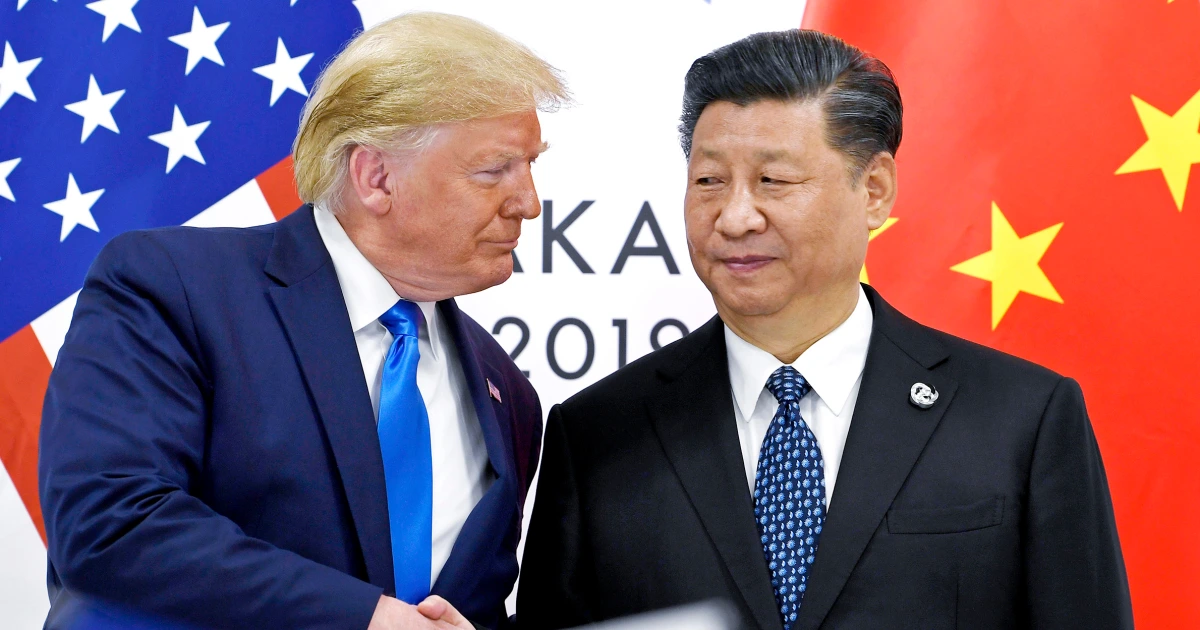
HONG KONG — President Donald Trump is set to speak with Chinese leader Xi Jinping on Friday as they try to finalize a deal to keep popular short-video app TikTok operating in the United States.
The call, which China has not yet confirmed, is expected to take place around 9 a.m. ET. It will also focus on the ongoing trade war between the world’s two largest economies, and could set the stage for the leaders of the rival superpowers to hold their first in-person meeting since Trump returned to office.
Trump told Fox News on Thursday that the two sides were “very close to deals on all of it,” adding that his relationship with China is “very good” and “it sounds like they’ve approved TikTok.”
The app, which is estimated to have about 170 million active users in the U.S., faces a ban unless its Chinese parent company, ByteDance, agrees to sell the app’s U.S. assets to U.S. owners. The sale is required under a law Congress passed last year, citing national security concerns.
On Tuesday, Trump formally extended the deadline for a TikTok deal for a fourth time, until Dec. 16, a day after Treasury Secretary Scott Bessent said Beijing and Washington had struck a “framework” for an agreement, without providing details such as who would be taking over TikTok’s U.S. operations.
Trump has gone back and forth on the ban, but he credits TikTok with helping him win last year’s presidential election and has expressed concern about alienating its huge and youthful user base. He said Thursday during a visit to the U.K. that the app “has tremendous value” and that “very rich people and companies are going to be owning it.”
Earlier Thursday, China confirmed the two sides had reached a “basic framework consensus” on TikTok but repeated its opposition to the “politicization, instrumentalization and weaponization of technology and economic and trade issues.”
The Chinese government will never “seek any agreement at the expense of principled positions, corporate interests and international fairness and justice,” Commerce Ministry spokesperson He Yadong told reporters in Beijing.
This will be the first call between Trump and Xi since June, when Trump said they spoke for about 90 minutes in a discussion focused on trade.
At the height of trade tensions in April, U.S. and Chinese tariff rates reached as high as 145%, in what amounted to a mutual trade embargo. Since then they have been lowered under another “framework” deal, with new U.S. tariffs on Chinese goods capped at 30%, while China imposes a 10% additional tariff on U.S. goods.
The lower tariff rates are set to expire on Nov. 10 unless a deal is reached or the trade truce is extended once again.
The two countries also continue to tussle over export controls on strategically important products such as rare earths, an area where China has a near-monopoly, and U.S. chip technology.
U.S. officials have said the TikTok sale is necessary because of Chinese laws that require Chinese companies to share data requested by the government. They also cite concerns about data collection and the algorithm the app uses to recommend content to users, which they say is vulnerable to manipulation by Chinese officials.
TikTok denies sharing user data with Chinese authorities and says the U.S. has never provided evidence of Beijing trying to manipulate the algorithm.
Lawyers for TikTok and ByteDance say the powerful algorithm, which has helped fuel the app’s global success, is proprietary and thus difficult to sell to a U.S. company under Chinese law.
There are concerns that TikTok may continue to use the Chinese algorithm in the U.S.
Rep. John Moolenaar, R-Mich., chairman of the House Select Committee on the Chinese Communist Party, and Rep. Raja Krishnamoorthi, D-Ill., the committee’s ranking member, have both expressed opposition to any deal that keeps the algorithm under Chinese control or allows ByteDance to maintain an operational relationship with the new American TikTok.
“President Trump has all the leverage he needs to strike a deal that saves TikTok and complies with the law — which means making sure TikTok’s data and algorithm are truly in American hands,” Krishnamoorthi said in a statement Thursday.
Any deal would most likely need to be approved by Congress as well as ByteDance’s board.
Though a TikTok deal may seem like a breakthrough, it could end up being a “Pyrrhic victory,” said Dimitar Gueorguiev, an associate professor of political science and director of Chinese studies at Syracuse University.
TikTok’s algorithm has “lost much of its mystique” as other social media platforms develop similar tools, and any U.S. buyer is “purchasing market share and user base, not transformative technology,” he said in written comments.
“For Beijing, that makes TikTok an expendable concession,” Gueorguiev said. “Chinese officials have let the issue fester for years, holding it in reserve as a problem they could one day solve to defuse pressure from Washington.”
The “real contest,” he said, is in access to advanced technology in areas such as semiconductors and artificial intelligence.
“That is the front line of technological competition,” he said.



